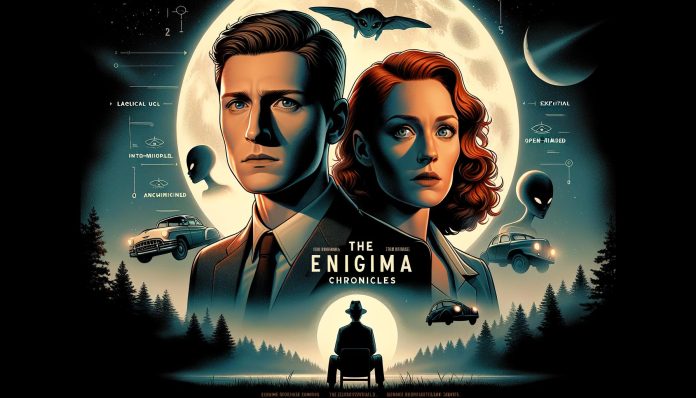The world of television has seen countless series come and go, but few have left a lasting impact quite like The X-Files. As a fan of both the paranormal and science fiction genres, I couldn’t resist diving into this iconic series that has captivated audiences since its debut in 1993. In this review, I will explore the show’s themes, character development, and cultural significance, while also sharing my personal insights as a longtime viewer.
The X-Files follows FBI agents Fox Mulder and Dana Scully as they investigate unsolved cases known as “X-Files.” These cases often involve paranormal phenomena, government conspiracies, and extraterrestrial life. Created by Chris Carter, the series uniquely blends elements of horror, mystery, and drama, making it a standout in television history.
The Characters: Mulder and Scully
One of the most compelling aspects of The X-Files is the dynamic between its two principal characters, Fox Mulder and Dana Scully. Mulder, played by David Duchovny, is a passionate believer in the paranormal, driven by the mysterious abduction of his sister. In contrast, Gillian Anderson’s Dana Scully serves as the skeptical scientist, often grounding Mulder’s theories in reality.
This interplay between belief and skepticism forms the backbone of the series, creating a rich narrative that explores the complexities of truth and faith. As I watched their relationship evolve, I found myself invested not only in their cases but also in their personal journeys. The chemistry between Mulder and Scully is palpable, making their partnership one of the most memorable in television history.
Themes and Storytelling
The X-Files is renowned for its ability to tackle a variety of themes, from government secrecy and the quest for truth to the nature of belief and the unknown. Each episode serves as a microcosm of these larger ideas, often drawing on real-world events and societal fears.
For instance, the show often references Cold War paranoia, tapping into the public’s anxiety about government surveillance and alien life. Episodes like “The Erlenmeyer Flask” and “Home” exemplify how The X-Files uses horror elements to address deeper societal issues, making it relevant across different eras.
I found that the storytelling ranged from the deeply philosophical to the downright bizarre, with some episodes delving into pure science fiction while others embraced horror and thriller elements. The series’ ability to oscillate between these genres is a testament to its creativity and innovation.
Standout Episodes
While the series boasts a plethora of memorable episodes, a few stand out as particularly impactful.
- “Pilot” (Season 1, Episode 1): The pilot episode sets the stage for the entire series, introducing us to Mulder and Scully and their first case involving a mysterious abduction. The eerie atmosphere and compelling character introductions draw viewers in from the very beginning.
- “Clyde Bruckman’s Final Repose” (Season 3, Episode 4): This episode combines humor and tragedy as it follows a man who can predict people’s deaths. It’s a brilliant exploration of fate and free will, showcasing the series’ ability to weave complex narratives with emotional depth.
- “The Post-Modern Prometheus” (Season 5, Episode 5): Shot in black and white, this episode pays homage to classic horror films. It features a unique blend of dark humor and poignant storytelling, highlighting the show’s versatility and creativity.
- “Bad Blood” (Season 5, Episode 12): A fan-favorite, this episode is told from two different perspectives, providing a humorous take on the series’ usual tone. It showcases Mulder and Scully’s relationship while delivering an engaging storyline.
The X-Files has had a profound impact on popular culture and the science fiction genre. It has spawned two feature films, a revival series, and countless parodies and references in other media. The show’s influence can be seen in contemporary series such as Stranger Things and The X-Files revival itself, which returned to the screen in 2016 after a lengthy hiatus.
Moreover, the series has ignited a passion for conspiracy theories and the paranormal among fans. I often find myself engaged in discussions about the plausibility of the events depicted, pondering the real-life implications of government secrecy and the mysteries of our universe. The show encourages viewers to question what they know and to explore the unknown.
The Technical Aspects
Beyond its storytelling and character development, The X-Files is notable for its technical achievements. The cinematography, special effects, and sound design create an immersive experience that enhances the eerie atmosphere of the series.
The theme song, composed by Mark Snow, has become iconic in its own right, instantly recognizable and synonymous with the show. The use of ambient sounds and unsettling score adds to the suspense, making each episode a thrilling experience.
Conclusion: Why You Should Watch The X-Files
If you’re a movie, tech, or paranormal enthusiast, The X-Files offers a rich tapestry of storytelling that combines suspense, humor, and thought-provoking themes. The series is not just about investigating the unknown; it invites viewers to ponder deeper questions about belief, truth, and the nature of reality.
Whether you’re a newcomer or revisiting the series, I encourage you to explore the world of Mulder and Scully. Their journey is not only entertaining but also a reflection of our own search for answers in a world filled with uncertainty.
<iframe width="560" height="315" src="https://www.youtube.com/embed/b_D3ysY_QCA?si=Aa9mWZ5gtyUT5-9a" title="YouTube video player" frameborder="0" allow="accelerometer; autoplay; clipboard-write; encrypted-media; gyroscope; picture-in-picture; web-share" referrerpolicy="strict-origin-when-cross-origin" allowfullscreen></iframe>




.jpg?w=100&resize=100,70&ssl=1)
